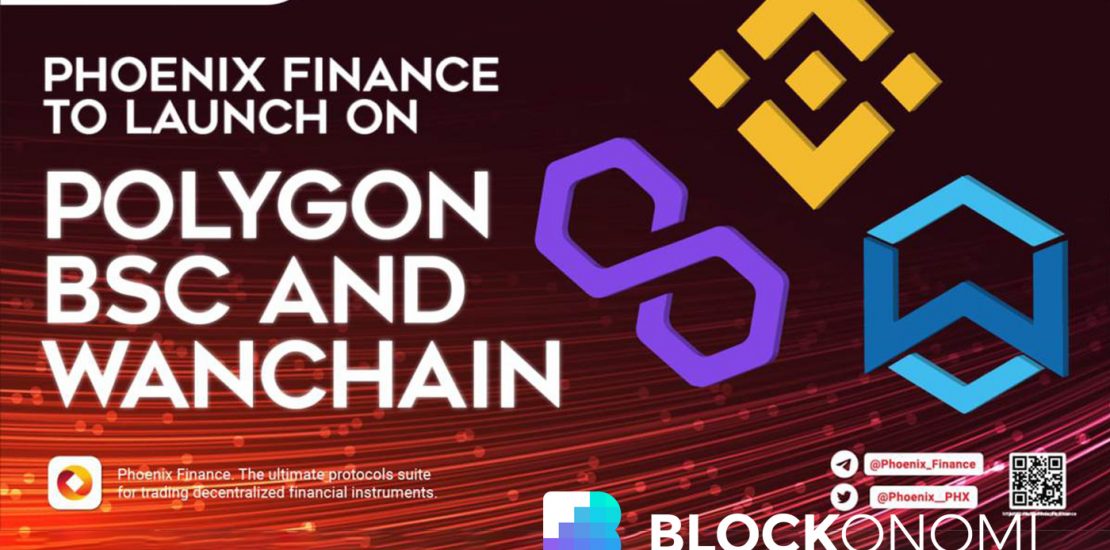- August 9, 2021
- Posted by: admin
- Category: BitCoin, Blockchain, Cryptocurrency, Investments


In what promises to be an action-packed month, DeFi project Phoenix Finance (PHX), formerly FinNexus, is set to relaunch its protocols on Polygon, Binance Smart Chain, and Wanchain. The deployment will first go live on the Ethereum layer-2 platform, Polygon.
Following a successful relaunch on Polygon, Phoenix Finance will expand to BSC and Wanchain, with both networks offering a solution to the setbacks of high gas fees and scalability facing Ethereum. The Phoenix team is also keeping a close eye on Ethereum L2 projects, Arbitrum as a potential future platform to deploy on.
What Phoenix Finance Brings To The Table
Straight out the door, Phoenix Finance users can expect to enjoy a brand new UI that guarantees a seamless experience while interacting with the protocols. The mining and staking mechanisms have been carefully crafted to make for steady, significant gains, forging a stable environment for future growth.
The upcoming platform primarily features two core products, namely, options and decentralized leverage tokens. BTC, ETH, USDC, USDT can be used as collateral for accessing any of them.
The APYs for these products will be derived from lending interests (for leveraged tokens), premiums (in options), PHX basic incentives, and PHX boosting incentives.
What are Options?
Options are a versatile investment instrument that acts as a hedge against risks. It also enables users to increase or accumulate gains.
Phoenix options are traded with an innovative pooled liquidity system that allows for truly efficient use of existing funds, with options being written collectively by the pool and premiums shared among all participants. Risks are automatically shared, while options buyers can set any parameter they like.
Some of the planned liquidity pools will be available on decentralized exchanges like Quickswap, Sushiswap, Uniswap, ApeSwap, PancakeSwap, and Wanswap.
What are decentralized leveraged tokens?
Leveraged tokens, already popular in centralized finance, are derivatives that Phoenix Finance aims to bring into the world of DeFi. They were initially introduced by derivatives exchange FTX before other exchanges started listing them.
These derivatives allow users to obtain leveraged exposure to cryptocurrency markets, without going through the troubles of managing a leveraged position. Users can have access to a product but need not fear any risk of liquidation.
An example that illustrates how the decentralized leveraged token works is the ETHBULL/USD, also known as 3X Long Ethereum Token. This token returns 3 times the daily return of ETH, meaning when the value of the normal ETH increases by a certain percent, the value of ETHBULL rises by 3 times the percentage.
Relaunch Timeline
The options and the leveraged tokens on the Polygon chain are expected to go live on August 9. The options product under the Wanchain chain will launch on August 16 while both the options and leveraged token for the BSC chain will be rolled out on August 23.
The options and leveraged tokens of the chains, especially those of Wanchain and BSC are to be deployed primarily due to the vast number of users trading on the two chains.
PHX Mining
The PHX token is central to all operations of the Phoenix platform across all proposed blockchains, and hence a liquidity mining program is planned to encourage users to support the growth of the ecosystem.
Aside from providing liquidity to planned PHX pools on DEXes such QuickSwap, Sushiswap and ApeSwap, users can also directly stake PHX on the upcoming platform.
Incentives are not capped when it comes to the amount of PHX that can be staked – the more an investor stakes, the longer the lock period, the higher the rewards. (Though rewards grow slower as the funds increase.) PHX can be locked for up to 36 months to boost the incentives.
To learn more about Phoenix Finance visit their website and social media channels, including Medium and Twitter.
The post Phoenix Finance To Relaunch Protocols on Polygon, BSC, and Wanchain appeared first on Blockonomi.
